As the ability of artificial intelligence grows it is increasingly having an effect on many areas of our everyday lives. One area where it could have the biggest impact is artificial intelligence in healthcare.
Smart technologies, machine learning programs and robotic devices are all contributing to the positive impact that artificial intelligence is having in the healthcare world.
As technologies and our understanding of the possibilities provided by these technologies develops the impact of artificial intelligence in healthcare can only grow. In turn making medicine more accessible, affordable and accurate.
What follows are 10 of the most important ways in which artificial intelligence is impacting positively on healthcare both now and in the future.
Artificial Intelligence in Healthcare
Table of Contents
Artificial Intelligence Drives Innovation In Radiology Tools
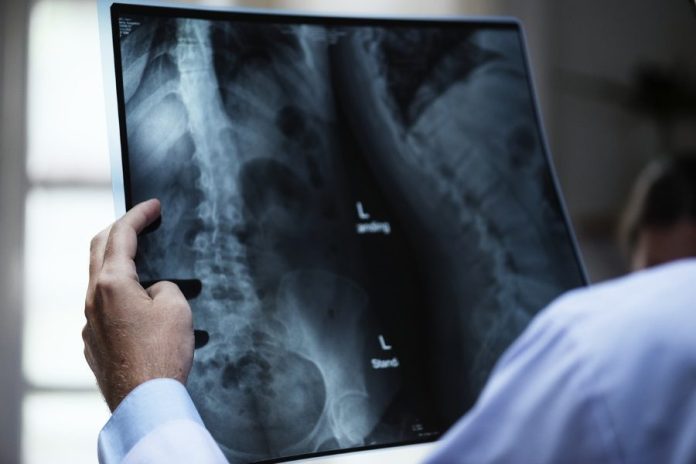
For many years it has been possible to obtain images of the insides of the human body through non-invasive means such as X-rays, CT scans and MRI scans.
However many forms of diagnosis still require invasive action such as taking tissue samples or biopsies. While these are highly effective they also come with the risk of infection.
If a patient is already seriously unwell the risk is amplified. This is one area in which the use of artificial intelligence in healthcare can make a major impact.
Further, focused, development of artificial intelligence in healthcare will enable the creation of the next generation of radiology tools.
Thanks to the use of artificial intelligence these tools will provide a non-invasive means of taking tissue samples or biopsies. This will ultimately make healthcare safer.
Alexandra Golby, MD, is a director of Image-Guided Neurosurgery at Brigham and Women’s Hospital and her team are at the forefront of this research.
Golby has stated that their goal is for “imaging to give us information that we presently get from tissue samples”.
However for this to succeed the artificial intelligence will have to be able to reliably “achieve very close registration so that the ground truth for any given pixel is known.” If Golby’s team are successful in this quest then healthcare diagnosis procedures will be transformed.
Non-invasive diagnosis

Clinicians will be able to not only make a diagnosis without the need for invasive, and potentially dangerous, procedures but they will also be able to develop a better understanding of how tumours function, how aggressively certain cancers may behave and how to effectively target treatments.
Meanwhile, the University College London Hospital has teamed up with Google’s DeepMind Health in the hope of developing machine learning algorithms that will be able to differentiate between cancerous tissue and healthy tissue.
Successful developments here could lead to radiation treatments becoming more focused, leaving healthy structures unharmed.
Artificial intelligence is driving innovation in the field of radiology. Ultimately this will allow healthcare professionals to make more accurate and safer diagnoses and also allow for more focused, less invasive treatment plans.
The Development of Immunotherapy In The Treatment Of Cancer
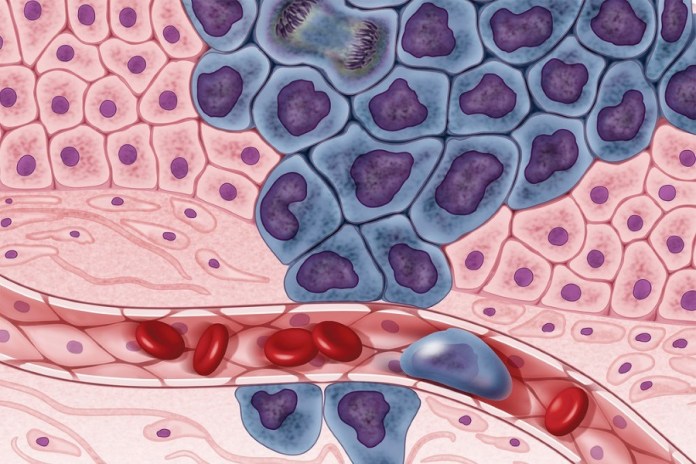
In the healthcare, world immunotherapy is viewed as potentially one of the most exciting weapons in the battle against cancer.
Immunotherapy works by using the body’s own immune system to fight the disease. In some cases, even the most stubborn tumours have been defeated in this way.
Currently, however, few patients respond effectively to the available immunotherapy options.
Adding further frustration to the process is the fact that at the moment healthcare professionals do not have a reliable method of identifying which patients will respond well to immunotherapy.
Machine Learning Algorithms to Analyse Complex Datasets

This is where artificial intelligence comes into play. It is hoped that machine learning algorithms will be able to quickly combine and analyse highly complex datasets.
This ability to read an individual’s unique genetic makeup will then enable healthcare professionals to tailor treatment programs to the individual.
One such example is the John Hopkins ImmunoMap
In December 2017 academic scientists based at John Hopkins University published as a research paper in Cancer Immunology Research. This revealed that they had been able to create a digital map from sequences of T-cells and exposed it to a lab-grown virus.
The team were then able to use an unsupervised learning algorithm to convert the T-cell receptor sequencing data into numeric distances based on similarities in receptor sequences.
This information was then grouped functional specificity by the artificial intelligence algorithms.
The team are now focusing their efforts on finding similarities in the T-cell groupings that may be used to target the same antigen.
This is a growing field of research within the realm of artificial intelligence in healthcare.
While more patient data is needed this is one area that the use of artificial intelligence in healthcare is benefiting from.
While more patient data is needed this is one area that the use of artificial intelligence in healthcare is benefiting from, as are patients.
Turning Selfies Into Smart Diagnostic Tools

Often when discussing the role of artificial intelligence in healthcare we think of complex machines operated by highly qualified people in the sterile confines of a healthcare facility.
While this is often true, in some areas ordinary smartphones, and the photographs they take, are beginning to play just as important a role in diagnosis.
As cameras, and the technology behind them become more advanced it is increasingly possible for experts to make diagnoses simply by consulting photographs.
This can be particularly useful in developing nations or more remote areas where healthcare isn’t easily accessible.
Both dermatology and ophthalmology are looking to make use of the developments in smartphone technology.
Healthcare professionals are increasingly looking to use smartphone selfies and photographs to collect images of wounds, infections, skin lesions and the eyes.
This use of smart technology allows specialists to assess a patient without having to be there in person and can be used to combat the shortage of specialists as well as reducing the amount of time a patient must wait before a diagnosis is made.
It is also particularly useful in remote areas or poorer nations where healthcare provision is sparse and difficult to reach.
How Surgery Can Benefit From Artificial Intelligence

Robotics and other artificial intelligence driven applications have been estimated to add around $40 billion to the world of healthcare.
As the technology advances artificial intelligence is able to do a range of increasingly sophisticated tasks from analyzing data and pre-op medical records to guiding instrument during surgery.
It has been estimated that the use of artificial intelligence in healthcare can reduce a patient’s hospital stay by up to 21%.
This shortened stay allows hospital beds to be freed up, reducing cost and meaning that more people can be treated.
Increasingly healthcare professionals are seeing artificial intelligence assisted surgery as a good option.
This is largely because it is considered “minimally invasive” meaning that large incisions aren’t required, speeding up patient recovery time.
Artificial intelligence in healthcare is also being used to analyse data from past operations. This analysis is used by healthcare professionals to develop and perfect new surgical techniques.
The experiences of 379 orthopaedic patients were taken into account for one study.
This study concluded that surgical procedures conducted with the assistance of artificial intelligence and robotics resulted in five times fewer complications than operations conducted without the assistance of artificial intelligence.
Robotic Surgery

Increasingly artificial intelligence driven robots are being used to perform more complicated operations.
As well as performing eye surgery the Da Vinci, the most advanced robot focused on developing the role of artificial intelligence in healthcare, now lets doctors perform incredibly complex procedures with far greater levels of control than traditional methods offer.
As well as performing general surgical techniques scientists and healthcare professionals are developing artificial intelligence driven robots with specific tasks in mind.
For example, the Heartlander is a tiny robot, that can enter the chest via a small incision, performing mapping and therapy on the surface of the heart.
Wearable Devices That Monitor Your Health

Smart devices are increasingly becoming more common, from remote-controllable central heating systems to self-driving cars. This smart technology can also help the user improve their health.
Wearable health trackers such as FitBits or apps that count steps and wearable devices that track a heartbeat are increasingly popular. These can monitor not only the wearer’s heart rate but also their activity levels.
Not only are these devices capable of warning the user of the need to get more exercise but they can also record abnormalities such as heart palpitations.
This information can then be shared with artificial intelligence systems and healthcare professionals such as doctors.
This data, if properly analysed and supplemented with patient information, can give the healthcare professional a more accurate view of the habits and needs of their patients, allowing for treatment to be more tailored and effective.
If people can be encouraged to share this information correctly than artificial intelligence will play a significant role in extracting actionable insights from this large and varied treasure trove of data.
MORE – Data Science – 8 Powerful Applications
Using Artificial Intelligence Applications to Improve Medical Devices
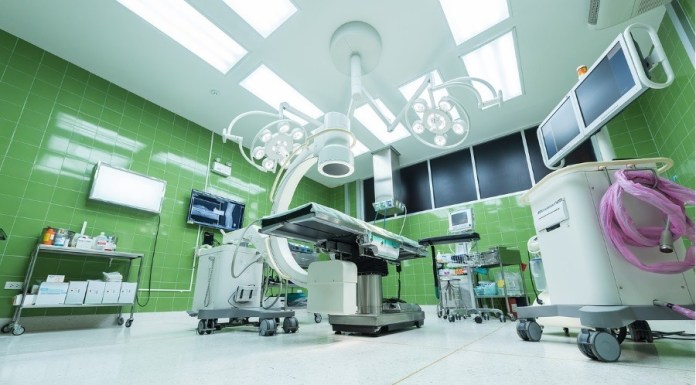
As the influence of artificial intelligence in healthcare grows smart products are becoming more widely used and accepted.
As this continues to develop hospitals and manufacturers will have to constantly update their security processes as well as their clinical workflow integration, data management automation and patient experience.
For the healthcare industry, device security is becoming a key priority.
In a similar way to how computer networks can be vulnerable to security issues, vulnerabilities in medical devices can potentially put patients at risk.
This problem is only increasing with the growth in network-connected medical devices that are able to transmit data wirelessly.
That these are also frequently integrated into the hospital or healthcare facilities clinical workflow only adds to the risk.
As the systems used in healthcare grow increasingly complex system management also becomes more expensive.t
Role of Robotic Process Automation (RPA) in Healthcare
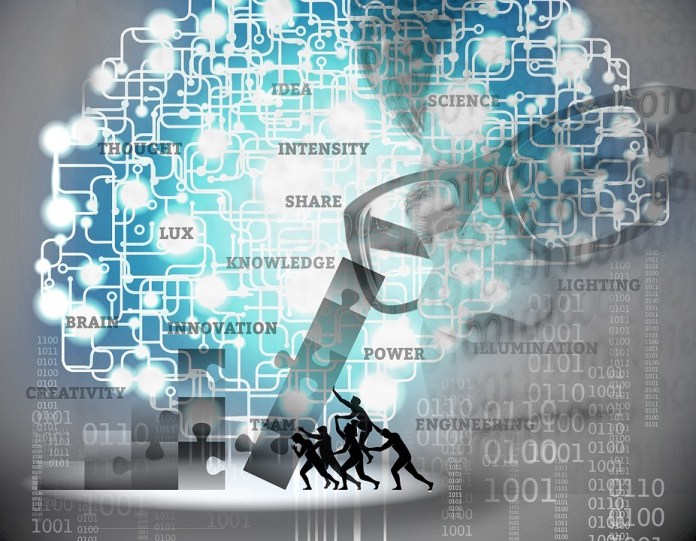
Implementing artificial intelligence driven solutions such as robotic process automation are helping to scale processes in an efficient and cost-effective way.
This allows for resilience to outside interference, such as malicious hackers or diseases, to grow.
The smart machines that are frequently being used in the healthcare field are also able to offer quick and accurate real-time analysis of patient data.
However, the healthcare field is yet to realise the full possibilities of this technology.
As Brian Lawrence, chief technology officer at Hill-Rom Welch Allyn, has said, “Our industry has created brilliant hardware, software and algorithms that can sense literally hundreds of patient parameters from basic vitals to more complex and subtle measurements,” he said.
“Unfortunately, we often don’t make full use of the capabilities we already have and aren’t attune to what we could be doing technologically.”
As artificial intelligence driven technology develops further and more smart applications come into everyday use then artificial intelligence driven total patient care will become a reality.
This will see healthcare professionals relying on artificial intelligence driven devices to monitor patient levels and statistics as well as compiling data and analyzing data sets and results.
As a result healthcare professionals will have a near-instant, accurate picture of the patient’s situation which will speed up diagnosis and treatment time, cutting costs and saving lives.
MORE – RPA – 10 Powerful Examples in Enterprise
MORE – Computer Vision Applications in 10 Industries
How AI Can Play In The Management of Medical Records

Record management is a vital but time-consuming role in healthcare.
Compiling and analyzing patient information, such as medical records, test results and past medical history is often a key step in the diagnosis and treatment process.
If the records are not easily accessible, for example, they are kept at various facilities all over the country, this can become a complicated and time-consuming process.
Thankfully this is one area where the use of artificial intelligence in healthcare can make a real difference.
If records are digitalised then artificial intelligent applications and programs can collect and access them remotes as well as analysing the information making it easy for healthcare professionals to interpret.
MIT Combining OCR, Natural Language Processing (NLP) and Machine Learning
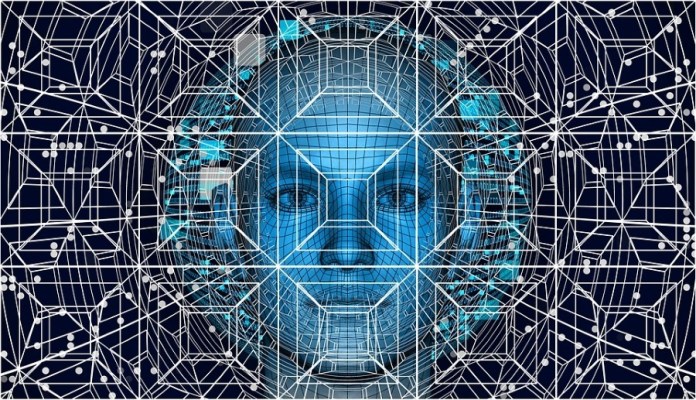
Machine learning-based applications along with support vector machines and optical character recognition programs such as MATLAB’s machine learning driven handwriting recognition technologies and Google’s Cloud Vision API are already being used to assist in the process of digitizing electronic health information.
This process helps healthcare professionals quickly access complete sets of records, speeding up diagnosis and treatment times.
Leading the way in developing the next generation of intelligent electronic healthcare records is the MIT Clinical Machine Learning Group.
They are aiming to develop applications with built-in artificial intelligence, specifically machine learning abilities, that can help healthcare professionals with the diagnostic process allowing them to quickly make clinical decisions and devise individual treatment programs.
MIT acknowledges that there is a growing need for “robust machine learning algorithms that are safe, interpretable, can learn from little labeled training data, understand natural language, and generalize well across medical settings and institutions.”
Big Data Radiology and Cardiology

Artificial intelligence can make a major impact on healthcare, particularly when it comes to analyzing test results, data entry and performing countless other mundane, time-consuming tasks.
All of these can be done more accurately and more quickly by intelligent applications than their human counterparts.
Two of the areas of healthcare with the largest amount of data to analyse are radiology and cardiology.
Often the amount of data regarding either discipline can be overwhelming.
As artificial intelligence becomes more capable of accurately carrying out many of these administrative tasks the workload will ease meaning that cardiologists and radiologists will be able to treat the patient more quickly and more efficiently.
The Role of Artificial Intelligence in Drug Development

As we have already seen the role of artificial intelligence in healthcare is potentially wide-ranging and game-changing. Another area where artificial intelligence can have an impact is in the field of drug development and research.
Machine learning, in particular, is increasingly being used in the field of preliminary (early-stage) drug discovery.
Here artificial intelligence has the potential to be used in a number of ways from the initial screening of drug compounds to predicting the success rate based on various factors such as biology.
Next-generation sequencing is just one of the many technologies being applied in the research and development field.
Precision Medicine and AI
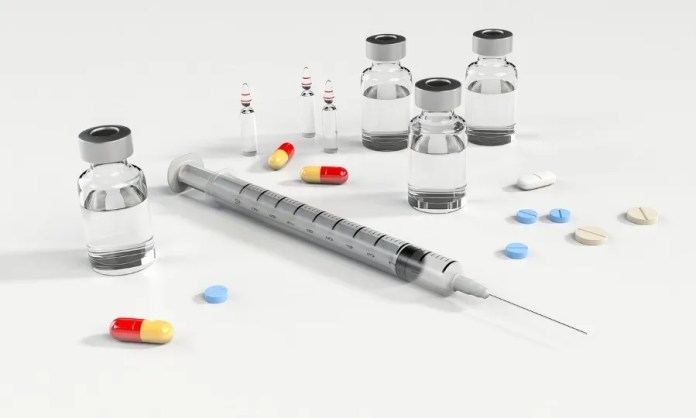
Another area that artificial intelligence is having a major impact is in the area of precision medicine.
Here healthcare professionals and scientists are increasingly realising the value of using artificial intelligence driven applications to identify mechanisms for “multifactorial” diseases.
This then allows for the development of alternative treatments and therapies.
Increasingly this is seeing artificial intelligence driven applications performing unsupervised learning.
Currently, this is mainly confined to identifying patterns in data.
The next stage, using these patterns to make predictions is still done by “supervised learning” however further developments in the future may see artificial intelligent applications operating completely unsupervised.
The MIT Clinical Machine Learning Group have so far focused much of their precision medicine research on the development of algorithms to further understand disease processes.
They have then used this information to create an effective treatment of diseases like Type 2 diabetes.
Also operating in this field is Microsoft’s Project Hanover. This uses machine learning applications in a variety of ways such as a highly publicised collaboration with the Knight Cancer Institute.
This partnership is aiming to develop artificial intelligence-driven technologies that facilitate precision treatment for cancer patients.
Artificial intelligence and machine learning in bio-manufacturing for pharmaceuticals is a constantly developing field that can have a wide-ranging impact on the world of healthcare.
The proper use of artificial intelligence will allow the pharmaceutical manufacturing field to produce new and better drugs quicker than ever before, this will ultimately result in lowered costs and improved replication.
The Role of Artificial Intelligence in Aiding Diagnosis

Despite all the advances in medicine and healthcare over the last 150 years mistakes can still happen. It has been reported that incorrect diagnoses play a role in roughly 10% of patient deaths.
Incorrect diagnoses are also thought to be responsible for between 6% and 17% of all complications patients suffer from whilst in hospital.
Artificial intelligence, it is thought, can remove the potential for human error making diagnoses an almost certainty.
Accurate diagnosis not only prevents complications, and in some cases patient death but it can also cut costs and help to prevent chronic diseases developing or sudden patient deterioration.
Any future progress in this field will largely be driven by artificial intelligence. The healthcare industry is increasingly looking at artificial intelligence powered predictive analytics and clinical decision support tools.
Artificial Intelligence Acting as an Early Warning System

One area that artificial intelligence can play a role is by acting as an early warning system for conditions that are difficult to diagnose without time consuming analysis of complicated datasets such as sepsis or the onset of seizures.
The director of Bioinformatics at Beth Israel Deaconess Medical Center Cancer Research Institute, Andrew Beck, has acknowledged that while “Identifying the presence or absence of metastatic cancer in a patient’s lymph nodes is a routine and critically important task for pathologists” the process of “peering into [a] microscope to sift through millions of normal cells to identify just a few malignant cells can prove extremely laborious using conventional methods.”
With this in mind, Beck’s team have harnessed the power of artificial intelligence and deep learning algorithms to build an automated diagnostic tool that is able to differentiate between cancerous and noncancerous cells.
While the machine is not yet perfect, an evaluation conducted in 2016 determined that Beck’s tool achieved a diagnostic success rate of 92% which is only 4% lower than human pathologists.
It is hoped that further developments and research will further perfect the process.
Humans and artificial intelligence working together in diagnosis

Interestingly for anyone interested in artificial intelligence in healthcare when human pathologists’ analyses were combined with the results of analysis done by the automated tool, the diagnostic success rate rose to a near-perfect 99.5%.
Until recently the focus on artificial intelligence in healthcare has been predominantly on using artificial intelligence to replicate or replace, human tasks.
The results of the combination of the artificial intelligence driven tool complementing the work of a trained human is exciting and can possibly lead to near-perfect diagnoses.
This accuracy will help to inform treatment decisions.
It is also thought that machine learning and other artificial intelligence driven means will help to inform decisions regarding the care of critically ill patients such as those in a coma.
Traditionally treatment decisions for unresponsive patients are informed only after time-consuming study of data sets.
Depending on the healthcare professional involved, their experience and skillset, the reading of these sets may vary.
Brandon Westover, MD, PhD, Director of the MGH Clinical Data Animation Center acknowledged this saying that “Sometimes when we’re looking to see if someone is recovering, we take the data from ten seconds of monitoring at a time. But trying to see if it changed from ten seconds of data taken 24 hours ago is like trying to look if your hair is growing longer.”
Westover realises that artificial intelligence can play a vital role in these cases, “But if you have an AI algorithm and lots and lots of data from many patients, it’s easier to match up what you’re seeing to long term patterns and maybe detect subtle improvements that would impact your decisions around care.”
Artificial Intelligence in Healthcare – Visual Pattern Recognition
Another area that artificial intelligence is making an impact in the field of visual pattern recognition.
Independent studies have shown that 50% to 63% of U.S. women who get regular mammograms will, over a 10 year period, receive at least one “false-positive”, this is a test result that wrongly indicates the possibility of cancer.
This mistake will then require further testing and, sometimes, unnecessary procedures causing great stress to the patient and incurring unnecessary costs.
However well trained the person mistakes can happen, it has been said that if two radiologists look at the same mammography they will see different results.
Visual pattern recognition software is able to store and quickly compare hundreds and thousands of images.
Currently, this technology is estimated to be 5% to 10% more accurate than the average physician.
These statistics can only improve as the technology becomes more nuanced, closing the accuracy gap between the human and digital eye.
These advances will, in turn, advance many areas of healthcare including diagnostic processes, pathology work, and ophthalmology.
The implementation of artificial intelligence in the fields of clinical decision support, risk scoring, and early alerting is a potentially revolutionary approach to data analysis.
As the artificial intelligence used in healthcare become more advanced and nuanced patient care and diagnosis can only benefit.
The Role of Artificial Intelligence In Clinical Trials And Research

The use of artificial intelligence in healthcare has many possible benefits.
One such benefit is the use of artificial intelligence, in particular, machine learning, in helping to shape and direct clinical trials and research programs.
It is thought advanced predictive analytics, gathered by artificial intelligence, can be applied to help identify the ideal candidates for clinical trials.
This is possible as artificial intelligence driven analysis can focus on a far wider range of data than human researchers, including social media accounts, dietary habits and genetic information.
This will help to identify the best possible candidates. This research can be done more quickly, accurately and far cheaper by artificial intelligence driven tools than by qualified healthcare professionals or researchers.
Artificial intelligence and machine learning in particular can also be used for remote monitoring of clinical trial participants as well as real-time data access. This increased level of surveillance will make clinical trials far safer for participants.
According to McKinsey, the use of artificial intelligence in healthcare-focused clinical trials and research can have many benefits including increasing clinical trial efficiency and identifying the best sample sizes which again helps to increase efficiency.
Conclusion
Artificial intelligence has only relatively recently started to make waves in the world of healthcare.
However it is already responsible for a number of developments and improvements as the technology, and our understanding of it improves the role of artificial intelligence in healthcare can only grow.
Images: Flickr Unsplash Pixabay Wiki & Others



















